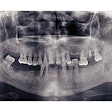
Obesity is associated with worse periodontal conditions, according to a recent literature review on the relationship between obesity and periodontal disease. Conversely, periodontal treatment appears to significantly reduce several biochemical biomarkers associated with obesity.
Periodontal disease is known to be associated with a number of systemic disorders, including obesity, a condition that predisposes individuals to a variety of comorbidities and complications that affect overall health. The basic commonality between periodontitis and obesity is that both are characterized by a dysregulated inflammatory state, wrote the authors, led by Dr. Carina Silva-Boghossian, PhD, of the Federal University of Rio de Janeiro School of Dentistry.
Individuals with obesity present a constant inflammatory state, which likely affects the subgingival environment and influences the local microbiota on the teeth and gums. The purpose of the review, which was published on August 2 in Current Oral Health Reports, was to explore recent literature to understand the effects of obesity on periodontal treatment outcomes and whether periodontal treatment can improve systemic biomarkers in obese individuals.
Multiple obesity measures linked to perio disease
The U.S. Centers for Disease Control and Prevention (CDC) calculates obesity through the use of body mass index (BMI). A healthy BMI is in the range of 18.5 to 24.9, with higher levels associated with the categories "overweight" (25-29.9) and "obese" (30 and higher). However, critics suggest that BMI alone can be misleading and other parameters, such as those related to fat distribution, can help provide a more complete picture of an individual's health.
In their review of the literature, the authors found that several measures of obesity correlate with the presence of bacteria associated with periodontal disease. For example, one study found that young adults classified as overweight or obese on the BMI scale carried higher levels of the pathogenic species Tannerella forsythia and Porphyromonas gingivalis compared to normal-weight individuals. Other studies found that other parameters associated with obesity, such as waist circumference, hip circumference, and waist/hip ratio, showed the same correlations.
Higher rates of periodontitis were also observed in obese individuals, suggesting that such individuals may have an impaired periodontal response to bacterial challenge due to the "hyperinflammatory state" associated with obesity. Such tissue can recruit inflammatory cells and induce exacerbated production of proinflammatory proteins, the authors explained.
Perio treatment tied to improved obesity biomarkers
A second question investigated by the authors was whether periodontal treatment can affect obesity biomarkers, which could result in improved systemic health.
Here, the authors concluded that periodontal treatment alone was able to significantly reduce serum levels of several obesity biomarkers associated with systemic health. Two biomarkers in particular exhibited robust results: retinol-binding protein 4 (RBP4), a plasma protein synthesized in the liver and adipose tissue that binds and transports retinol (vitamin A) from the liver to peripheral tissues, and tumor necrosis factor-alpha (TNF-α), a potent hormone and endocrine mediator of inflammatory and immune functions.
Some of the biomarker studies also combined periodontal treatment with a low-calorie diet. Interestingly, the beneficial effects of periodontal treatment were found across all treatment groups, with or without weight reduction. The review authors were unclear on why periodontal treatment alone would reduce these obesity biomarkers.
"Further investigations are needed to improve our comprehension of mechanisms that can explain that mechanism," they wrote.
Effects of obesity on periodontal treatment
The authors also sought to investigate the effects of obesity on periodontal treatment, but they were unable to reach a firm conclusion due to conflicting studies on the topic. Some studies found that obesity was associated with worse clinical outcomes after periodontal treatment, with one study showing an effect comparable to that of smoking. However, other studies found no effect of obesity on periodontitis treatment.
Regardless of the conflicting outcomes of studies, the authors concluded that dental professionals need to be mindful of periodontal treatment in obese patients.
"Despite controversies in clinical findings after periodontal therapy in obese individuals, dental professionals should be aware that obesity is a chronic metabolic disease, and that periodontal treatment should be a part of a comprehensive treatment of obesity," the authors concluded.



















